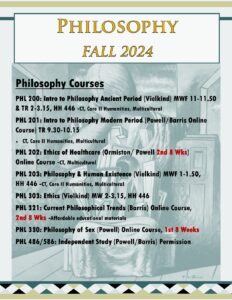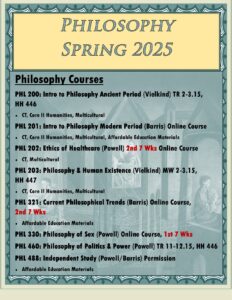The Marshall University Philosophy Program has three full-time faculty members, all having earned Ph.D. degrees from top philosophy schools. We are unique in the tri-state area in three ways. We offer courses in three of the major contemporary philosophical styles, analytic, continental, and pragmatist philosophy, rather than just one. We are part of the only interdisciplinary degree in the area, the Marshall Humanities Major, team-teaching with the programs of classics and religious studies. (In other words, we benefit from the insights of three disciplines in studying philosophy in its various historical and cultural contexts.) And our degree is organized as a “contract” with each major, in which the student designs a large part of her or his own overall program.
Our faculty members are deeply familiar with a wide range of the history of philosophy from Plato to the present. They are also at the cutting edge of their various specialties, doing adventurous research, and being in contact with a variety of leading philosophers. This creates an exciting environment for our students, and unusual opportunities for our majors to make contacts and enter graduate school. Recent graduates have gone on to graduate study at nationally respected schools, in philosophy, English, law, divinity, and art history.
More generally, entering into philosophy enables us to participate better in the “dance of life”: to appreciate the joyful things more fully and widely and to steer through the hard things more successfully. It is at this deep level of developing what is meaningful in individual and communal life, more than any other, that our faculty members’ research and teaching contribute to exploring illuminating and helpful ground.
Faculty
Contact us:
Fall 2024 Courses 
PHL 200 – Introduction to Philosophy, Ancient Period (Critical Thinking, Core II Humanities, Multicultural)
PHL 201 – Introduction to Philosophy, Modern Period (Critical Thinking, Core II Humanities, Multicultural)
PHL 202 – Ethics of Healthcare (Critical Thinking, Multicultural)
PHL 303 – Ethics (COLA Humanities)
PHL 321 – Current Philosophical Trends
PHL 330 – Philosophy of Sex
Spring 2025 Courses
PHL 200 – Introduction to Philosophy, Ancient Period (Critical Thinking, Core II Humanities, Multicultural)

PHL 201 – Introduction to Philosophy, Modern Period (Critical Thinking, Core II Humanities, Multicultural)
PHL 202 – Ethics of Healthcare (Critical Thinking, Multicultural)
PHL 203 – Philosophy and Human Existence (Critical Thinking, Core II Humanities, Multicultural)
PHL 321 – Current Philosophical Trends
PHL 330 – Philosophy of Sex
Course Catalog 2024-2025


The origins of philosophical activity among the Greeks by means of a selective sounding of several major thinkers.

A detailed consideration of selected texts from Ancient philosophy, such as the pre-Socratics, Plato, Aristotle, the Stoics, the Epicureans, the Academic Skeptics, and the neo-Platonists.
Pre-req: ACT Composite with a score of 26 or SAT Verbal Before March 16 with a score of 600.

Questions and answers concerning the nature of existence and human values and how we come to know them.

A basic introduction to ethical theory, followed by an application of this theory to problems in health care. For students in health care professions and those interested in applied ethics.

An introduction to philosophy drawing from both ancient and modern thinkers and texts.

Philosophical approaches to dealing with life's deep challenges and difficult moments, with the help of some of the great classics of world thought.

An interdisciplinary course to introduce students to the elements of a humanistic education through study of film. (Same as Classics 250 and Religious Studies 250; PR or CR: ENG 101)
Pre-req: ENG 101 with a minimum grade of C or ENG 200H (may be taken concurrently) or ENG 201H (may be taken concurrently) or ENG 101P (may be taken concurrently).

Introduction to three standard systems of formal logic: traditional categorical syllogistic logic, sentential logic, and first-order predicate logic.
Group or individual study of areas demanding further study of a more specialized depth.
Group or individual study of areas demanding further study of a more specialized depth.
Group or individual study of areas demanding further study of a more specialized depth.
Group or individual study of areas demanding further study of a more specialized depth.
A deconstruction of the major time-worn prejudices and presuppositions of Platonism by way of a radical reading of Plato's great dialogue the REPUBLIC.
The application of basic ethical theories to contemporary moral issues drawn from such fields as medicine, business and the environment.
A critical study of diverse moral norms, ideals and systems in theory and practice.
Theory and practice of valid principles of thinking including developing the skills of justifying diverse types of belief and evaluating reasons for conflicting standpoints (for example, racial, gender, and ethnic differences).

Examination of the qualities involved in the appreciation of beauty which serve as standards of taste.
Great American thinkers, including thinkers such as Emerson (transcendentalism), Peirce, James, Dewey, and Rorty (pragmatism), Royce (idealism), Quine (analytic philosophy), and de Man (post-structuralism).

The relations of the world's philosphies to the basic cultural and religious traditions of the world and to the development of the world community.
Selected reading in contemporary thought embracing such movements as realism, Marxism, post-structuralism, deconstruction, and postmodernism.
Introduction to some of the basic authors, texts, and themes in this branch of philosophy beginning with Plato's SYMPOSIUM.

An introduction to the philosophy of sexual orientation and its relation to gender, with a special focus on issues of knowledge and politics.

Reflections on crucial concepts of modern science relevant to philosophical issues in interpreting man and the universe; special attention given to epistemological and other problems of mathematics and physical and social sciences.

An introduction to contemporary feminist theory including discussion of current gender-related issues.
Pre-req: ENG 102 or ENG 302 or ENG 201H or ENG 200H or YGS 162 or IST 201 or CL 231 or CL 232 or CL 319 or PHL 200 or PHL 200H or PHL 201 or PHL 201E or PHL 303 or PHL 321 or PHL 303E or PHL 340 or PHL 353 or RST 205 or RST 206 or RST 300 or RST 304 or RST 320 or RST 325.
Pre-req: ENG 102 with a minimum grade of D or ENG 302 with a minimum grade of D or ENG 201H with a minimum grade of D or ENG 200H with a minimum grade of D or YGS 162 with a minimum grade of D or IST 201 with a minimum grade of D or CL 231 with a minimum grade of D or CL 232 with a minimum grade of D or CL 319 with a minimum grade of D or PHL 200 with a minimum grade of D or PHL 200H with a minimum grade of D or PHL 201 with a minimum grade of D or PHL 201E with a minimum grade of D or PHL 303 with a minimum grade of D or PHL 303E with a minimum grade of D or PHL 321 with a minimum grade of D or PHL 340 with a minimum grade of D or PHL 353 with a minimum grade of D or RST 205 with a minimum grade of D or RST 206 with a minimum grade of D or RST 300 with a minimum grade of D or RST 304 with a minimum grade of D or RST 320 with a minimum grade of D or RST 325 with a minimum grade of D.
Advanced study of major philosophers drawn from the ancient Greek and Roman period.
Advanced study of major movements in philosophy from the 17th century on, movements such as rationalism, empiricism, idealism, and existentialism.
Pre-req: PHL 201 or PHL 201E.
Advanced study of the most basic nature of reality. (PR: 3 hrs. of philosophy).
Advanced study of the nature and possibility of knowledge.
Ancient and modern theories of the meaning and consequence of history and culture.
Theories of the nature and functions of religion, including the meaning of religious language and the problems of belief.
Advanced study of the significance or the place in human reality of political organization, negotiation, strategy and power.
A study of existential philosophers from Kierkegaard to Heidegger, Sartre and beyond.
Advanced study of the nature of logic: whether logic is possible at all, how far it applies, and whether and how there can be conflicting logics.
Shared study and research on a special topic as announced.
Shared study and research on a special topic as announced.
Shared study and research on a special topic as announced.
Shared study and research on a special topic as announced.
Designed for majors as a senior humanities seminar and the culminating interdisciplinary study in the humanities program. (Same as CL 490 - 494 and RST 490 - 494)
Pre-req: ENG 102 with a minimum grade of D or ENG 302 with a minimum grade of D or ENG 201H with a minimum grade of D or ENG 200H with a minimum grade of D or YGS 162 with a minimum grade of D or IST 201 with a minimum grade of D or CL 231 with a minimum grade of D or CL 232 with a minimum grade of D or CL 233 with a minimum grade of D or CL 319 with a minimum grade of D or PHL 200 with a minimum grade of D or PHL 200H with a minimum grade of D or PHL 201 with a minimum grade of D or PHL 303 with a minimum grade of D or PHL 321 with a minimum grade of D or PHL 340 with a minimum grade of D or PHL 353 with a minimum grade of D or RST 205 with a minimum grade of D or RST 206 with a minimum grade of D or RST 300 with a minimum grade of D or RST 304 with a minimum grade of D or RST 320 with a minimum grade of D or RST 325 with a minimum grade of D.
Designed for majors as a senior humanities seminar and the culminating interdisciplinary study in the humanities program. (Same as CL 490 - 494 and RST 490 - 494)
Pre-req: ENG 102 or ENG 302 or ENG 201H or ENG 200H or YGS 162 or IST 201 or CL 231 or CL 232 or CL 233 or CL 319 or PHL 200 or PHL 200H or PHL 201 or PHL 303 or PHL 321 or PHL 340 or PHL 353 or RST 205 or RST 206 or RST 300 or RST 304 or RST 320 or RST 325.
Designed for majors as a senior humanities seminar and the culminating interdisciplinary study in the humanities program. (Same as CL 490 - 494 and RST 490 - 494)
Pre-req: ENG 102 or ENG 302 or ENG 201H or ENG 200H or YGS 162 or IST 201 or CL 231 or CL 232 or CL 233 or CL 319 or PHL 200 or PHL 200H or PHL 201 or PHL 303 or PHL 340 or PHL 321 or PHL 353 or RST 205 or RST 206 or RST 300 or RST 304 or RST 320 or RST 325.
Designed for majors as a senior humanities seminar and the culminating interdisciplinary study in the humanities program. (Same as CL 490 - 494 and RST 490 -494)
Pre-req: ENG 102 or ENG 302 or ENG 201H or ENG 200H or YGS 162 or IST 201 or CL 231 or CL 232 or CL 233 or CL 319 or PHL 200 or PHL 200H or PHL 201 or PHL 303 or PHL 321 or PHL 340 or PHL 353 or RST 205 or RST 206 or RST 300 or RST 304 or RST 320 or RST 325 or ENG 201.